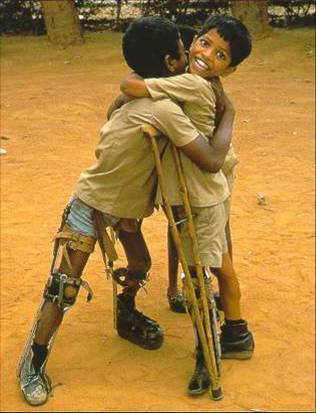
For those of you who aren’t familiar with polio, it’s a highly infectious virus that spreads readily through contaminated water and unsanitary conditions especially among infants and young children. It’s a very old disease, ancient Egyptian engravings even documented those paralyzed by polio.

But nowadays, it’s not present in the US, but a little more than 50 years ago, we had nearly 60,000 cases. Why such a drastic drop? Two reasons- the development of an effective vaccine and the public/political will to eliminate polio from our borders. Groups such as the Rotary Club launched initiatives to ensure that the days of placing children in an iron lung to keep them alive would no longer happen.
In 1988, the World Health Assembly resolved to eliminate polio globally. To give you an idea of how much progress has been made, in 1988 there were 350,000 cases in 125 countries. In 2003, there were only 784 cases in 6 polio endemic countries. And now, there are only 4 polio endemic countries- India, Pakistan Nigeria, and Afghanistan. This reduction was brought about by the dedication and determination of public health workers. Civil wars have been halted temporarily to vaccinate children, public health workers have been in the some of the most dangerous environments in order to ensure that all children have the opportunity to get vaccinated. And now, polio is on the brink of being only the second disease in the history of humanity to become eradicated (smallpox being the first).

But the closer the world comes to polio elimination, the more difficult the task becomes. Why would poor countries want to continue an intensive polio elimination campaigns when they may not have had cases for years and have to deal with other pressing issues like HIV, malaria, and famine? But if anything, the past two years demonstrates the vulnerability when children aren’t vaccinated and efforts are let up. Rumors of western nations poisoning vaccines spread among Muslim populations in northern Nigeria, and many people refused to vaccinate their children. As a result, polio spread from Nigeria to 20 countries previously considered to be polio free.
In Bangladesh, the last polio case was in 2000. But keeping with my “one of the four horsemen of the apocalypse” coincidences (when I worked on syphilis elimination, rates doubled every year that I was there. Guess I just want job security or something, hah…), there have been 3 cases so far in 2006! After the first case, it was decided that over 4 million children in Bangladesh was vulnerable and a decision was made to have National Immunization days where basically all children are vaccinated. Public health workers even go from door to door to find each and every child. Amazingly enough, 600,000 workers (the majority being volunteers) were mobilized in a little over 3 weeks! Unbelievable. I have a hard enough time preparing for what I’ll wear in the morning, but this on an entirely different scale. If there ever is a global pandemic (like bird flu) and vaccines or treatments need to be distributed and given, I have no doubt it will be through the polio network. I’m excited to be a small part of this effort. I’ll be helping out for the last round of this national effort this Sunday, I can hardly wait.






No comments:
Post a Comment